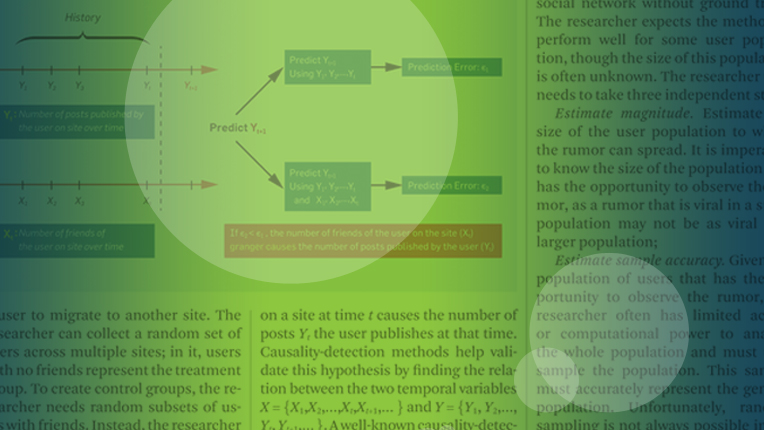Winners, SRC 2006 - 2007
GRADUATE CATEGORY
First Place:
Benjamin C Lee - Harvard University
Title of Submission: Statistical Inference for Efficient Microarchitectural and Application Analysis
Second Place:
Jik-Soo Kim - University of Maryland at College Park
Title of Submission: Employing Peer-to-Peer Services for Robust Grid Computing
Third Place:
Taiga Nakamura- University of Maryland
Title of Submission: HPCBugBase: An Experience Base for HPC Defects
GRADUATE CATEGORY
First Place:
Joshua Hailpern - Carnegie Mellon University
Title of Submission: WISE: A Wizard Interface Supporting Enhanced Usability
Second Place:
Yevgen Borodin - Stony Brook University
Title of Submission: A Flexible VXML Interpreter for Non-Visual Web Access
Third Place:
Murni Mahmud - University Of Manchester, UK
Title of Submission: A Mixed Method For Evaluating Input Devices With Older Persons
GRADUATE CATEGORY
First Place:
George Fairbanks - Carnegie Mellon University
Title of Submission: Design Fragments Make Framework Use Easier
Second Place:
Emerson Murphy-Hill - Portland State University
Title of Submission: Improving Usability Of Refactoring Tools
Third Place:
Dario Correal - Universidad de Los Andes, Colombia
Title of Submission: Definition And Execution Of Multiple Viewpoints In Workflow Processes
Grace Hopper Celebration of Women in Computing 2006 Winners
GRADUATE CATEGORY
First Place:
Laura Chiticariu
Title of Submission: A non-intrusive Data-driven Approach to Debugging Schema Mapping for Data Exchange
Second Place:
Bowen Hui
Title of Submission: Decision-Theoretic Intelligent Assistance
Third Place:
Jhilmil Jain
Title of Submission: Extensible and Dynamic Data Stucture Viewers in Java
UNDERGRADUATE CATEGORY
First Place:
Erica Yuan-Ting Huang
Title of Submission: Mobile phone keypad design for Fast Chinese Text Entry by Phonetic Spelling
GRADUATE CATEGORY
First Place:
Vivek Shrivastava
Title of Submission: On the (In)Feasibility of Fine Grained Transmit Power Control
Second Place:
Robin Snader
Title of Submission: Energy-Efficient Frame Dropping Policies for Multimedia
Third Place:
Vishnu Navda
Title of Submission: Deflect: Interference-aware Fast Path Adaptation in Wireless Mesh Networks
UNDERGRADUATE CATEGORY
First Place:
Michael Ford
Title of Submission: Opportunistic Bandwidth Allocation with SDR
GRADUATE CATEGORY
First Place:
Wenjin Zhou - Brown University
Title of Submission: Perceptual Coloring and 2D Sketching for Segmentation of Neural Pathways
Second Place:
Zeki Melek - Texas A&M University
Title of Submission: Bending Burning Matches and Crumpling Burning Paper
Third Place:
Makoto Okabe - University of Tokyo
Title of Submission: Illumination Brush: Interactive Design of Image-based Lighting
UNDERGRADUATE CATEGORY
First Place:
Anselm Grundhoefer - Bauhaus University, Germany
Title of Submission: Real-Time Adaptive Radiometric Compensation
UNDERGRADUATE CATEGORY
First Place:
Shiri Azenkot - Pomona College
Title of Submission: An Evaluation of the Edit-Distance-With-Moves Similarity Metric for Comparing Genetic Sequences
Second Place:
Scott Hale- Eckerd College
Title of Submission: Unsupervised Thresholding and Morphological Processing for Automatic Fin-outline Extraction
Third Place:
Jeffrey Adair - Hiram College
Title of Submission: Locating, Tracking, and Interpreting EAN-13 Bar Code Waveforms in a Two-dimensional Video Stream
GRADUATE CATEGORY
First Place:
Purvi Shah - University of Houston
Title of Submission: Fast Fourier Transforms on High Performance Computing Systems
ACM Case Studies
Written by leading domain experts for software engineers, ACM Case Studies provide an in-depth look at how software teams overcome specific challenges by implementing new technologies, adopting new practices, or a combination of both. Often through first-hand accounts, these pieces explore what the challenges were, the tools and techniques that were used to combat them, and the solution that was achieved.

Lifelong Learning
ACM offers lifelong learning resources including online books and courses from Skillsoft, TechTalks on the hottest topics in computing and IT, and more.

Publish with ACM
ACM's prestigious conferences and journals seek top-quality papers in all areas of computing and IT. It is now easier than ever to find the most appropriate venue for your research and publish with ACM.
